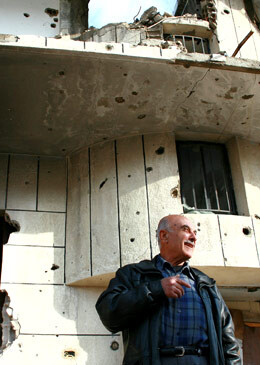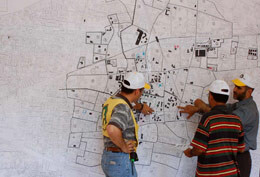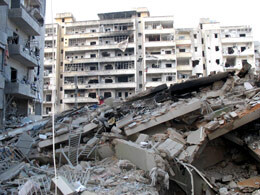Electronic Lebanon 11 April 2007

Khalil Ajami stands by the ruins of his four-apartment family home in Bint Jbeil (Hugh Macleod/IRIN)
The money was given to Nasrallah not by the Lebanese government, nor by Jihad al Binaa, Hezbollah’s construction wing, nor even by Hezbollah’s strategic Shia ally Iran, but by Qatar, a Sunni Gulf state that maintains trade relations with Israel.
“Let’s put it this way. Over the last four months, we’ve had Jihad al Binaa, Qatar and the government’s reconstruction committee visit us four times each,” said Nasrallah, pointing to the bright paint marks on a damaged building left by surveyors from each agency. “They all came, but in the end it was the Qataris who paid.”
International efforts to repair Lebanon’s war damage offer examples of bridging the sectarian divide, but rivalries between external donors, as well as the domestic political crisis between Hezbollah and the Sunni-led government of Prime Minister Fouad Siniora, are hampering reconstruction efforts, observers say.
‘We’re not looking for Shia or Sunni’
“The people were very thankful to us,” Khaled al-Hitme, an engineer in charge of Qatar’s US $300 million operation in Lebanon, told IRIN.
In the immediate aftermath of last July’s war, Qatar took on the responsibility of rebuilding four Shia-majority, largely Hezbollah-supporting towns in southern Lebanon — Khiam, Ait Achab, Bint Jbeil and Ainata.
“Qatar was clear in calling for an immediate end to hostilities from the beginning of the war. We’re not looking for Shia, Sunni, Hezbollah or Siniora,” said Hitme. “We pay directly to the people themselves. We see everyone as Lebanese citizens.”
By the end of January 2007, the Qataris had handed out more than 5,000 compensation cheques, averaging about US $6,000 each, to the people of the four towns — totalling more than US $30 million. Two further instalments are planned.
In addition, Qatar has made repairs to hospitals, schools and nearly 400 religious buildings, including the Grand Mosque at the heart of Bint Jbeil’s Old City.
While spending goes on, about 200 residents of Bint Jbeil have petitioned Qatar that surveys made by the Lebanese government’s Council of the South had underestimated the damage to their homes.
“This house was my life’s work,” said Khalil Ajami, standing by the ruins of the large, four-apartment family home he built in Bint Jbeil in the hope that some of his 13 children would eventually return to live with him in his old age.
Pockmarked with bullet holes and gutted by explosives, his once pristine home now serves only as a temporary overnight refuge for the former engineer, whose other home in southern Beirut was also destroyed.
“If I had money, I would not ask for money. I don’t want charity,” said the Shia grandfather. “The survey offered me US $40,000 compensation per apartment, but I estimate it will take $50,000 to rebuild each unit.”
Hitme said Qatar had independently verified the government agency’s estimates and that where damage had been undervalued, residents would be offered extra compensation.
‘We feel a certain hostility’

Members of the Hezbollah construction firm Jihad al-Bina look at a map of destroyed properties in Beirut’s southern suburbs. (Christian Henderson/IRIN)
With an estimated budget of US $112 million for projects lasting between six months to a year, Iranian money and expertise has overseen the repair or reconstruction of 60 schools across Lebanon, leaving 100 still on their to-do list, said Hussam Khoshnevis, head of the Iranian mission to aid the reconstruction of Lebanon.
Four hospitals out of 22 have been repaired, while 30 places of worship, including 10 churches and some Sunni mosques, have been completed, added Khoshnevis.
Electricity has been restored to 60 villages in the south, while Iran is also funding the rehabilitation of the electricity system in Beirut’s southern suburbs, which were particularly badly hit in the war.
Fifty of Lebanon’s bombed-out bridges are on the Iranian timetable, with 10 major ones fixed so far, while Iranian engineers are overseeing the repair of all of Lebanon’s damaged roads.
“We have taken on 150km of main roads and about 500km of smaller roads,” Khoshnevis said. “But there is a lack of information from the government, so we are mapping the roads ourselves.”
Information is not the only thing that has been less than forthcoming from the central government, said the engineer.
“We have an agreement with the government where we do the job ourselves and we hold onto the money and spend it directly,” said Khoshnevis. “But though we have this agreement, we feel a certain hostility from the government, and that we are not being appreciated for our efforts compared to other countries.”
Struggling to re-build southern suburbs

There is much political wrangling over the rebuilding of the southern suburbs of Beirut, which were particularly badly hit in the 2006 war. (Marie Claire Feghali/IRIN)
Designated by the US Treasury Department as a terrorist organisation, Hezbollah’s construction firm Jihad al Binaa — meaning ‘The Struggle to Build’ — claims it has been hampered in efforts to begin rebuilding Dahiyeh, Beirut’s worst-hit southern suburb, because of a lack of cooperation from the government.
Last November, all five Shia ministers resigned from the cabinet, and since December Hezbollah has been leading a rolling demonstration in central Beirut demanding more power for itself and its allies in government.
With some 300 buildings completely destroyed in the southern suburbs alone, Hezbollah has created a new foundation to oversee reconstruction of the area, to be known as ‘Al Wa’ad’ — ‘The Promise’.
But not a single building permit for the southern suburbs has been issued by the government in the past seven months, according to a report in Lebanon’s The Daily Star, leaving a legal vacuum in which many Dahiyeh residents have signed over power of attorney for their properties to Al Wa’ad.
“The government is giving some money but they will not oversee the reconstruction,” Bilal Naim, a member of the Executive Council of Hezbollah, told IRIN. “If the money is not enough, Hezbollah will make up the difference from its own funds. No one is happy with the government, which has not been able to take responsibility in this big crisis.”
The government has refused to pay money for reconstruction directly to Hezbollah, instead handing out compensation to individual families of about US $50,000 for each damaged apartment.
Al Wa’ad is to begin repairing buildings from next month, according to Naim, while contracting out rebuilding work.
This item comes to you via IRIN, a UN humanitarian news and information service, but may not necessarily reflect the views of the United Nations or its agencies. All IRIN material may be reposted or reprinted free-of-charge; refer to the copyright page for conditions of use. IRIN is a project of the UN Office for the Coordination of Humanitarian Affairs.
Related Links

